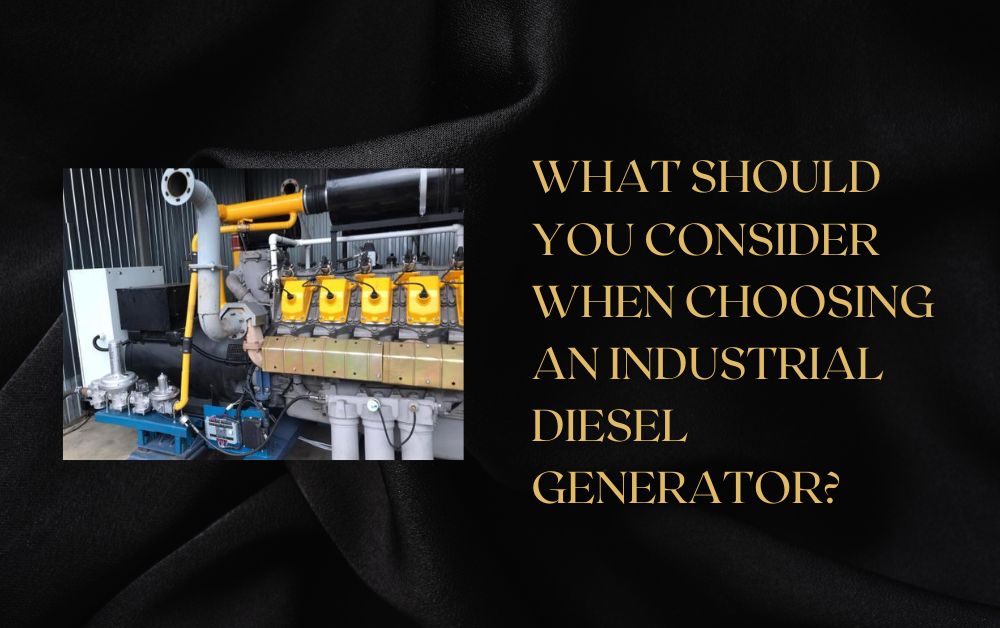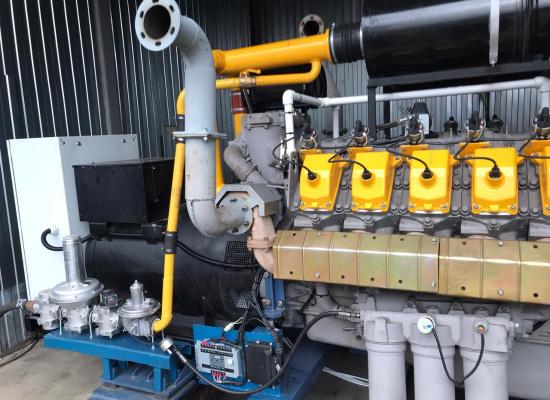
When it comes to powering industrial operations, diesel generators are a popular choice due to their reliability, efficiency, and durability. They are essential for providing backup power during outages and can also serve as the primary power source in remote locations. However, choosing the right industrial diesel generator for your needs involves careful consideration of various factors. In this blog, we will explore what to consider when selecting an industrial diesel generator, ensuring that you make an informed decision.
Understanding Industrial Diesel Generators
What Is an Industrial Diesel Generator?
An industrial diesel generator is a system that converts diesel fuel into electrical energy. It consists of a diesel engine and an alternator that work together to generate power. These generators are designed to handle high loads and operate for extended periods, making them suitable for industrial applications such as construction sites, manufacturing facilities, and large commercial buildings.
Note:- Ensure uninterrupted power for your operations with reliable industrial diesel generator in Dubai from FG Wilson. Designed for durability and efficiency, our generators are perfect for various industrial needs. Contact FG Wilson today to discuss the ideal power solution for your business!
Key Components of an Industrial Diesel Generator:
- Diesel Engine: The engine burns diesel fuel to produce mechanical energy.
- Alternator: The alternator converts mechanical energy into electrical energy.
- Control Panel: Manages the generator’s operation, including starting, stopping, and monitoring performance.
- Fuel Tank: Stores diesel fuel to power the engine.
Why Choose Diesel Generators for Industrial Use?
Diesel generators are favored for industrial use due to their ability to deliver consistent power, efficiency, and longevity. They can operate in various conditions and are often more fuel-efficient than other types of generators.
Advantages of Diesel Generators:
- Durability: Diesel engines are built to withstand heavy use and can operate for thousands of hours with proper maintenance.
- Fuel Efficiency: Diesel fuel provides more energy per gallon compared to gasoline, making diesel generators economical for long-term use.
- High Load Capacity: Diesel generators can handle high power demands, making them suitable for industrial applications.
Key Considerations When Choosing an Industrial Diesel Generator
1. Determine Your Power Requirements
The first step in selecting an industrial diesel generator is to assess your power needs. Understanding the total wattage required for your operations will help you choose a generator that can handle your load.
How to Calculate Power Needs:
- Identify Equipment: Make a list of all the equipment and machines that will need power.
- Calculate Total Wattage: Add up the wattage of each item to determine your total power requirement. Don’t forget to consider starting wattage for equipment with high startup demands.
- Consider Future Needs: If you anticipate growth or expansion, choose a generator with a higher capacity than your current needs.
2. Evaluate Fuel Efficiency and Capacity
Fuel efficiency is a crucial factor in the overall cost of operating a diesel generator. Look for a generator that offers high fuel efficiency to minimize operating costs. Additionally, consider the fuel tank size and how often you will need to refuel.
Key Points to Consider:
- Fuel Consumption Rates: Review the generator’s specifications for fuel consumption at various loads.
- Tank Size: A larger fuel tank allows for longer runtimes between refueling, which is important for uninterrupted operations.
- Availability of Diesel: Ensure that diesel fuel is readily available in your area, especially if you plan to use the generator frequently.
3. Assess the Generator’s Load Capacity
Industrial applications often require generators that can handle varying loads. It’s essential to select a generator with the right load capacity to meet both current and future demands.
Understanding Load Capacity:
- Continuous vs. Standby Power: Determine whether you need a generator for continuous power (running all the time) or standby power (used during outages). Choose a generator rated for the appropriate type of use.
- Load Management: Some generators come with features that help manage load fluctuations, making them suitable for environments with variable power demands.
4. Consider Noise Levels
Noise can be a significant concern in industrial settings, especially if the generator will be located near work areas or residential zones. Look for generators that are designed to operate quietly or those with noise-reducing features.
Noise Considerations:
- Decibel Rating: Check the generator’s decibel rating to understand its noise level. Look for models designed to operate at lower decibel levels.
- Soundproof Enclosures: Some generators come with soundproof casings that can significantly reduce noise levels during operation.
- Local Regulations: Be aware of any local noise regulations that may affect generator operation.
5. Evaluate Durability and Reliability
An industrial diesel generator is a significant investment, so it’s important to choose a model known for its durability and reliability. Look for generators that are built to withstand harsh conditions and have a reputation for dependable performance.
Factors to Assess Durability:
- Construction Quality: Inspect the materials used in the generator’s construction. High-quality materials contribute to longevity.
- Brand Reputation: Research manufacturers known for producing reliable generators and check reviews from other users.
- Warranty and Support: A good warranty can provide peace of mind. Look for manufacturers that offer strong customer support and service agreements.
6. Maintenance and Service Requirements
Proper maintenance is essential for keeping your diesel generator in good working condition. When selecting a generator, consider how easy it is to maintain and what services are available.
Key Maintenance Considerations:
- Maintenance Schedule: Understand the recommended maintenance intervals and what services are needed.
- Access to Parts: Ensure that replacement parts are readily available, either through the manufacturer or local suppliers.
- Service Support: Look for manufacturers or dealers that offer support services, such as regular maintenance checks or emergency repairs.
7. Look for Safety Features
Safety is paramount in industrial environments. Choose a generator equipped with safety features that protect both the equipment and personnel.
Essential Safety Features:
- Automatic Shutdown: Generators should have an automatic shutdown feature that activates in case of low oil pressure, high temperature, or other critical issues.
- Emergency Stop Button: This feature allows for quick shutdown in emergency situations.
- Safety Guards: Ensure that the generator has safety guards around moving parts to prevent accidents.
8. Analyze Installation Requirements

industrial diesel generator
Before purchasing a diesel generator, consider the installation requirements. Some generators may need special equipment or modifications to your facility to operate safely and efficiently.
Installation Considerations:
- Space Requirements: Assess the space needed for the generator, including clearance for maintenance and ventilation.
- Electrical Connections: Ensure that your facility can accommodate the electrical connections required for the generator.
- Permits and Regulations: Check if any local permits or regulations apply to the installation of a diesel generator.
9. Review Cost and Financing Options
Finally, consider the overall cost of the generator and your budget. While it’s important to find a generator that meets your needs, make sure it aligns with your financial resources.
Cost Factors to Consider:
- Initial Purchase Price: Compare prices across different brands and models, keeping in mind that the cheapest option may not always be the best quality.
- Operating Costs: Calculate the estimated operating costs, including fuel consumption and maintenance.
- Financing Options: Explore financing options if needed, including leasing arrangements or payment plans that fit your budget.
Conclusion
Choosing the right industrial diesel generator requires careful consideration of various factors. By assessing your power needs, evaluating fuel efficiency, and understanding load capacity, you can make an informed decision that suits your business requirements.
Additionally, considering aspects like noise levels, maintenance, safety features, and installation requirements will ensure that the generator operates effectively in your environment.
Investing in a reliable diesel generator is an essential step in securing uninterrupted power for your industrial operations. With the right generator, you can ensure that your business runs smoothly, even during power outages, helping you maintain productivity and achieve your goals. Take the time to research and select a generator that meets your specific needs, and you will reap the benefits of dependable power for years to come.
Note:- To read more articles visit on bigbizstuff.